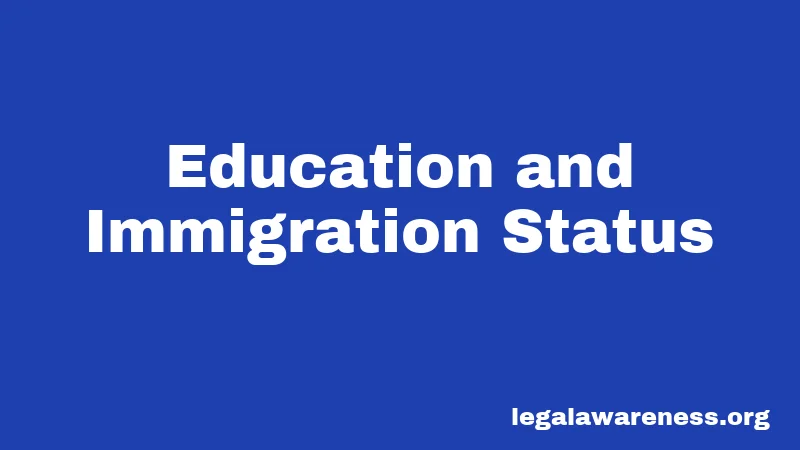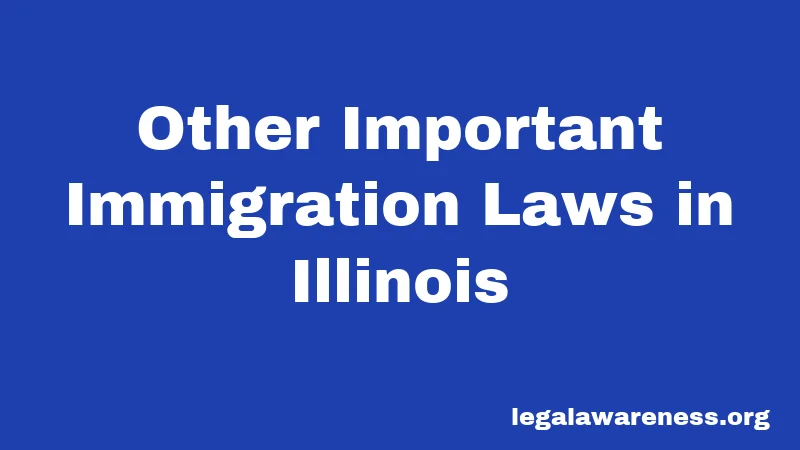Illinois Immigration Laws (2026): Protection and Your Rights
Immigration laws in Illinois are changing in major ways right now. Most people have no idea what protections and rules actually apply to them. Here’s the thing: Illinois just passed some of the strongest immigrant protection laws in the nation. These changes matter whether you’re an immigrant yourself, you know someone who is, or you just want to understand how your state works.
Stay with me here. The changes happening in 2026 are significant. They affect schools, hospitals, day care centers, and courts across the state. Understanding these new laws could literally protect you or someone you care about.
What Are Immigration Laws?

Immigration laws are rules that control who can live in a state and country. They cover everything from legal status to workplace rights. Think of them like the rulebook for who belongs where and what rights they have while they’re there.
Pretty straightforward, right?
In Illinois, immigration laws don’t just come from the federal government. The state has made its own rules that protect immigrants and their families. That’s unusual—and honestly, it’s a big deal.
The Biggest Change: HB 1312 (Safe Schools for All Act)
Here’s where things get important. Governor JB Pritzker signed House Bill 1312 in December 2025. This law creates broad protections for immigrants across the entire state. It’s one of the most protective immigration laws in America.
Want to know what it actually does? Let me break it down into pieces.
Protection at Courthouses
You need to feel safe going to court. That’s what this part of the law says. Civil immigration arrests are now banned inside courthouses. They’re also banned within 1,000 feet of courthouse buildings.
This means you can attend court hearings without fear. You could be a witness. You could be a victim testifying. You could be serving on a jury. None of that should put you in danger from immigration agents.
If someone is wrongly arrested at a courthouse, they can now sue for false imprisonment. The law allows them to recover at least $10,000 in damages. That’s specific money the court will award them.
Not sure how this applies to you? If you ever need to go to court in Illinois, this law protects you.
Privacy at Hospitals
Hospitals are supposed to be safe places. The new Health Care Sanctity & Privacy Law makes sure of that. Starting January 1, 2026, general acute care hospitals must have policies protecting patients from immigration enforcement.
Here’s what that means. Hospitals cannot unlock your private health information to immigration agents without proper legal paperwork. Your doctors won’t share your records just because someone asks. Privacy rules get much stricter.
This applies to all hospitals across Illinois. General hospitals need to implement these policies by January 1, 2026. Other hospitals have until March 1, 2026.
Why does this matter? People skip medical care when they’re afraid. They’re scared of being reported. This law says: get the help you need without that fear.
Protection in Schools
Schools should be places for learning, not for immigration enforcement. HB 1312 makes that the actual rule in Illinois.
Schools cannot exclude any child based on immigration status. None. A child can’t be kicked out or denied activities because of where they’re from or their legal status.
Schools also can’t ask for immigration documents. They can’t require Social Security numbers. They can’t share a student’s immigration status without permission.
By July 1, 2026, schools must develop procedures for handling law enforcement requests. If an agent wants to come on campus, there’s a formal process now. The school has to get approval first.
Confused about the difference between what’s legal and illegal? Schools also must keep these policies clear to families.
Protection at Day Care Centers
Young children need safe places too. Illinois now requires day care centers to protect kids’ immigration information.
Licensed day care centers cannot share immigration status information. Period. They also can’t let immigration agents into facilities without proper ID and legal paperwork. If an agent demands a child’s personal information, the center must tell the parents immediately.
Day care centers must create an action plan by January 1, 2026. This plan explains exactly what happens if enforcement agents show up. Knowledge is power for families.
Protection at Universities
College is expensive. It’s also supposed to be possible for everyone. Universities can’t use immigration status against students or staff.
Schools must develop new rules about which law enforcement can come on campus. They also can’t take actions based on someone’s actual or perceived immigration status. This protects international students, immigrant students, and staff.
Education and Immigration Status

Here’s one that parents care about deeply. Your child has a right to free public K-12 education. That right doesn’t depend on immigration status.
Schools cannot exclude children from programs or activities because of immigration concerns. They can’t ask about citizenship. They can’t share immigration information with authorities.
Schools must provide notice to families about these protections. By January 1, 2026, all schools need procedures in place.
Sound complicated? It’s actually pretty simple: come to school and learn.
Your Rights Under the New Law
Okay, pause. Read this carefully. You have specific rights under HB 1312.
You have the right to attend court without fear of civil immigration arrest. You have the right to private health information. You have the right to education for your children. You have the right to know if enforcement agents are at your school or day care.
You also have the right to sue if someone violates these protections. That means if you’re wrongly arrested, you can get money damages. That’s real legal protection.
Employers also cannot retaliate against you. They can’t contact immigration authorities. They can’t threaten to report your suspected status if you speak up about violations.
Other Important Immigration Laws in Illinois

HB 1312 isn’t the only protection. Illinois has other laws that matter.
Missing Persons Reports
Senate Bill 24 means no waiting period before reporting someone missing. Before, police could make you wait. Now they can’t. If someone goes missing, report it immediately. Police must enter the information into their system right away.
This might sound unrelated to immigration. But vulnerable immigrant families sometimes disappear because of exploitation. Faster reports help authorities respond quicker.
Tenant Rights
New laws protect renters too. Landlords must tell tenants about housing rights for domestic violence and sexual assault survivors. This helps protect vulnerable people in immigrant communities.
Know Your Rights Materials
Here’s something practical. The state provides know-your-rights information to families. The Illinois Department of Children and Family Services and Department of Early Childhood post materials online.
Day care centers must display these materials. Schools can help families find them. Hospitals have pamphlets available.
These documents explain:
What to do if enforcement agents come to your home. What to say and not say. Your right to a lawyer. Your right to remain silent.
Honestly, this is the part most people miss. These materials could protect you. Find them online or ask at your child’s school.
What About Employment and Immigration?
Employers have rules to follow under the new law. They cannot contact immigration authorities to retaliate against employees.
Let’s say you report unsafe working conditions. Your boss cannot respond by threatening to call immigration. That’s retaliation, and it’s illegal.
Also, employers can’t ask about immigration status for current employees. They can’t make you show specific documents proving citizenship.
This protects all workers. You can speak up about problems without fear.
Federal vs. State Law: Why This Matters
Here’s where it gets interesting. Immigration law is actually really complicated because it involves federal and state rules.
The federal government controls immigration enforcement through agencies like ICE. Federal law determines who can be deported. Federal law handles federal crimes.
But Illinois gets to set rules for the state. Illinois law protects state courts. Illinois law controls what state hospitals do. Illinois law says what schools can do.
Think of it like layers. Federal laws set one layer. State laws set another layer on top. You get protection from both.
The Trump Administration is challenging some of these state laws in court. That’s happening right now. But the laws are currently in effect while courts decide.
Penalties for Breaking These Laws
Wait, it gets better. There are consequences if people or institutions violate your rights.
If someone is wrongly arrested at a courthouse, they can sue for at least $10,000. That’s statutory damages. It’s a set amount the law automatically allows.
If a hospital releases health information illegally, that violates privacy laws. If a school punishes a child for immigration status, that breaks state law.
Violators can face lawsuits. They can face fines. Some violations could result in criminal charges.
The point: these aren’t just suggestions. They’re enforced rules with real consequences.
What If You Don’t Have Immigration Status Documented?
Most people think undocumented immigrants have zero rights. That’s not true in Illinois.
Under HB 1312, your protection doesn’t depend on your legal status. Regardless of your immigration situation, you get:
Protection at courts and courthouses. Access to hospitals with privacy. The right to free K-12 education for your children. Safe access to day care. Protection from retaliation at work.
These rights apply to everyone in Illinois.
Still worried? That makes sense. But these laws exist specifically because immigrants were vulnerable. The state recognized that and created actual protections.
How to Report Violations
So what happens if you witness a violation? Here’s what you should do.
If a school shares your child’s immigration information illegally, report it to the school first. Ask to speak with an administrator. Explain the violation.
If the school doesn’t respond, contact the Illinois Department of Education. You can also contact a legal aid organization. Many provide free legal help to immigrants.
If a hospital releases your information wrongly, contact the hospital’s privacy officer. Get the complaint in writing. Keep copies.
For courthouse arrests, contact an immigration attorney immediately. You may have legal grounds for damages.
Keep documentation. Write down dates, times, and what happened. Get names if possible. This helps lawyers help you.
What Lawyers Can Help?
You don’t need to handle this alone. Many lawyers specialize in immigration and immigrant protection.
Legal aid organizations provide free help if you qualify financially. The Illinois Coalition for Immigrant and Refugee Rights has resources. The American Civil Liberties Union (ACLU) has lawyers fighting for these protections.
Some lawyers work on contingency. That means they don’t charge you unless you win. You could get justice without paying upfront.
If you’re arrested or questioned, you have the right to a lawyer. Tell agents you want to speak with a lawyer before answering questions. Don’t sign anything without legal help.
FAQ: Common Questions About Illinois Immigration Laws
Do these protections apply if I’m undocumented?
Yes. HB 1312 protects everyone in Illinois regardless of immigration status. Your rights don’t depend on legal paperwork.
Can my child go to school if I don’t have documents?
Absolutely. Your child has the right to free K-12 education. Schools cannot exclude kids based on immigration status. They can’t ask about citizenship or legal status.
What if an immigration agent comes to my door?
You have rights. You can refuse to answer questions. You can request a lawyer. You don’t have to open your door or let them inside without a warrant signed by a judge. Say clearly: “I do not consent to a search.”
Can my employer ask about immigration status?
For new hires, employers can verify work authorization. For current employees, they generally cannot ask. They definitely cannot use immigration threats as retaliation.
What if I’m arrested at a courthouse?
That’s illegal under HB 1312. You can sue for false imprisonment. You could receive at least $10,000 in damages. Contact a lawyer immediately.
Do I need to carry immigration documents with me?
You don’t have to carry documents. But legally, you’re required to carry documents if you’re in the U.S. To be safe, carry them. If you’re undocumented, consult with a lawyer about your situation.
Will these laws get me deported?
No. These laws protect you from deportation. They don’t cause deportation. They limit enforcement actions and protect your privacy.
Important Changes by the Numbers
Illinois has made massive changes. Here’s what the numbers tell us:
1,000 feet – The zone around courthouses where civil immigration arrests are now prohibited.
$10,000 – The minimum amount you can recover if falsely arrested at a courthouse.
January 1, 2026 – When most of these protections take effect for schools and hospitals.
300+ – The approximate number of new Illinois laws taking effect in 2026, showing how serious the state is about reform.
What’s Still Federal Law?
These state protections are strong, but understand what they don’t change. Federal immigration enforcement still happens. Federal immigration law still applies.
ICE can still conduct raids. Deportation proceedings can still happen in federal court. If you committed certain federal crimes, federal law applies.
These laws don’t give you immunity from federal enforcement. They protect you at state institutions and in state processes. Big difference.
Immigration attorneys can explain your specific situation. Don’t assume you’re protected from everything. But do know you have serious protections in Illinois.
Preparing Your Family
If you’re worried about immigration enforcement, take action now.
Create a family plan. Write down a lawyer’s phone number. Teach children what to say if agents come to school. Keep important documents in a safe place.
Share passwords with trusted people. Make sure someone can care for your children if you’re detained. Write down bank account information.
Know-your-rights materials exist specifically for this. Review them with your family. Have conversations in whatever language everyone speaks best.
Many immigrant organizations offer free workshops. Attend one. Learn your rights from people trained to explain them.
Final Thoughts
Illinois has created strong protections for immigrants and everyone who needs them. These aren’t perfect. Federal law still poses challenges. Not every situation is covered.
But these protections represent real progress. They say that Illinois values everyone’s safety, privacy, and rights. They say that going to school, seeing a doctor, or attending court shouldn’t require fear.
Now you know the basics. Stay informed. Know your rights. Connect with community organizations. If you need legal help, ask for it. These laws exist to protect you.
And remember: you belong here. That’s not just a nice phrase. It’s what Illinois law now says.
References
Official State Resources
- Illinois Governor’s Office – HB 1312 Safe Schools for All Act
- Illinois General Assembly – 2026 New Laws
- Illinois Department of Education
Legal and Community Resources
- Illinois Coalition for Immigrant and Refugee Rights
- American Civil Liberties Union (ACLU) – Illinois
- Legal Aid Chicago
- Know Your Rights – Immigrant Defenders Law Center
News and Updates
